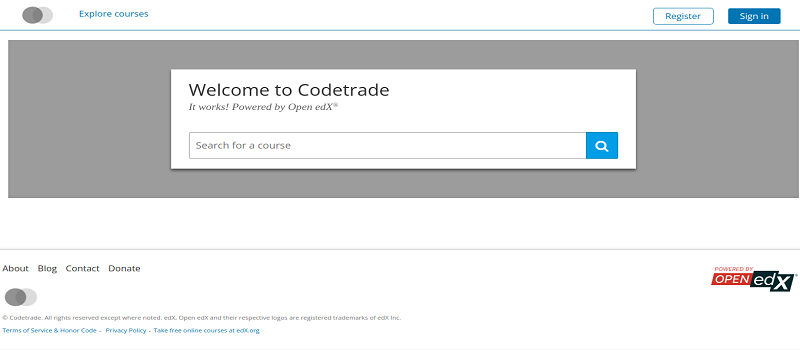
The Complete Guide to Install Tutor Dev Koa Release
Streamline your Open edX project work with tutor dev Koa and enhance your coding skills. If you are unclear about how to install Tutor Dev Koa, this guide is for you. This step-by-step guide will show you how to install the Tutor Dev Koa release on your system. It doesn't matter if you are a seasoned developer or just getting started, this guide will help you.
Tutor Dev Koa Release
Tutor Dev Koa Release is an advanced platform designed to streamline the process of creating and managing online courses. It provides educators, instructors, and institutions with a robust toolkit for designing interactive and engaging learning experiences.
Koa, the 11th Open edX community release version on 9th June. Koa introduces several enhancements, such as customized learner schedules, milestones to track progress, and LTI 1.3 grading support. The front-end implementations of Open edX are now adopting micro-frontends and can be easily integrated into Koa. Furthermore, the underlying operating system has been updated to Ubuntu 20.04 to ensure ongoing security updates.
Prerequisites for Installation
Before installing Tutor version 11 alongside the EdX Koa release, it is necessary to complete the following installation steps:
(Note: We tested on these Docker versions to install Tutor Dev Koa)
- Docker version: v17.06+
- Docker Compose version: v1.22.0+
Follow the Given Steps to Install Docker
Remove or uninstall already installed Docker Version
$ sudo apt-get remove -y docker docker-ce docker-ce-cli containerd.ioCheck the available Docker Version
$ apt-cache madison docker-ce | awk '{ print $3 }'Set the required docker version using VERSION_STRING
$ VERSION_STRING={docker_version}Install Docker
$ sudo apt-get install -y docker-ce=$VERSION_STRING docker-ce-cli=$VERSION_STRING containerd.io docker-buildx-plugin docker-compose-pluginFollow the command to check the Docker status and version
$ sudo systemctl status docker $ docker --version
Install Docker Compose
Remove the already installed Docker Compose version
$ sudo rm /usr/local/bin/docker-composeCheck for the required Docker Compose version
$ apt-cache madison docker-compose | awk '{ print $3 }'Install Docker-Compose
$ sudo curl -L "https://github.com/docker/compose/releases/download/1.25.0/docker-compose-$(uname -s)-$(uname -m)" -o /usr/local/bin/docker-composeSet access permission to access the Docker-Compose file
$ sudo chmod +x /usr/local/bin/docker-composeVerify the Docker-Compose Version
$ docker-compose --version
Step-by-Step Guide to Install Tutor Dev Koa Release
1. Make Tutor Directory
Create a new directory named “tutor_koa” in the current location.
$ mkdir tutor_koa2. Go to that Directory
Change the current working directory in a terminal or command prompt to the directory named "tutor_koa”.
$ cd tutor_koa3. Download the Compiled Binaries
Download the most up-to-date binaries, which are highly advantageous for Tutor installation, by visiting the following link: https://github.com/overhangio/tutor/releases. Utilize the provided command line to accomplish this. (For our instance, we've installed Tutor version 11.3.1)
$ sudo curl -L "https://github.com/overhangio/tutor/releases/download/v11.3.1/tutor-$(uname -s)_$(uname -m)" -o /usr/local/bin/tutor
4. Assign Permission
Use the command to grant permissions to the folder where Tutor has been downloaded using root access.
$ sudo chmod 0755 /usr/local/bin/tutor5. Tutor Version
Verify the currently installed version of Tutor
$ tutor --version6. Tutor Development Installation
Execute the given command to install Tutor in development environment. Here, we set up development environment so choose 'n', to execute further process.
$ tutor local quickstart
Subsequently, the procedure will prompt you to provide three specific details related to the Tutor platform, which will be stored in the config.yml file.
Once the installation process is finalized, all services will be initialized.

7. Tutor Plugins
Execute the given command to check the Tutor plugins
$ tutor plugins list
8. Enable/Disable Plugin
Execute the command to enable or disable the plugins.
$ tutor plugins enable/disable (plugin-name)To enable or disable the plugin name you would replace "(plugin-name)" with the name of the specific plugin you want to activate.

9. Save Config File
Once plugins have been enabled or disabled, or any changes to the configuration have been made, it is important to save the config.yml file.
$ tutor config save
10. Run the “quickstart” command
Finally, execute the given command to complete your tutor dev koa release in your system $ tutor local quickstart
You are now able to utilize the Tutor Dev Koa release to create and manage your personalized Open edX platform, accessible at http://local.overhang.io.

Conclusion
By following the step-by-step installation process outlined in this guide, you've taken the crucial first step towards harnessing the power of Tutor Dev Koa Release. From its interactive features to its personalized learning capabilities, this platform holds the potential to revolutionize the way we teach and learn.
If you want to develop your own Open edX platform using Koa, you can reach out to CodeTrade, a well-known Open edX development agency located in India. CodeTrade is recognized as a certified Open edX partner and provides a range of services including consulting, support, maintenance, and personalized development assistance for various components of your learning management system (LMS).
Get a free consultation for your Open edX queries from CodeTrade, Contact us now…!